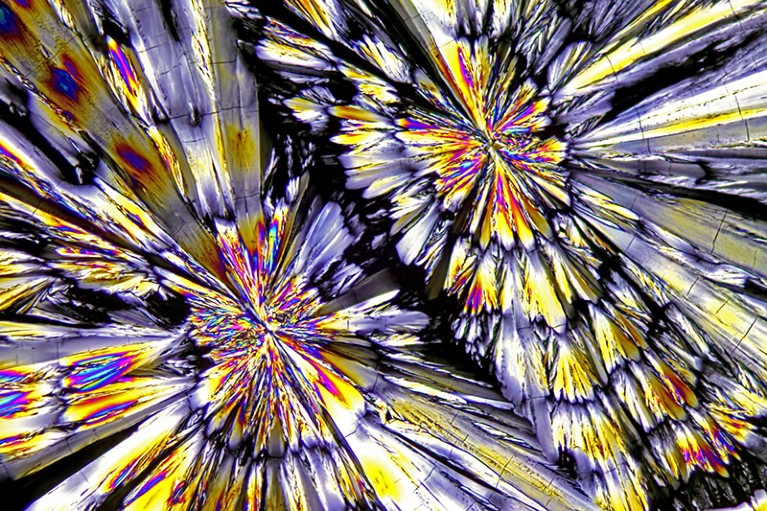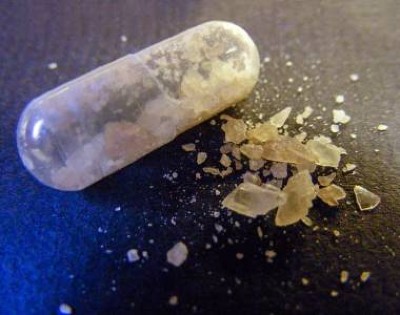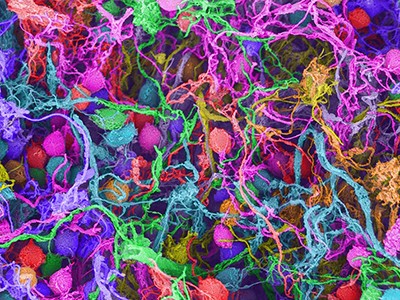
Crystals of ketamine, which is growing in popularity as a treatment for depression and anxiety.Credit: M. I. Walker/Science Photo Library
The drug ketamine is enjoying a second life. First developed as an anaesthetic that was used widely by US battlefield surgeons during the Vietnam war, it is growing in popularity as a treatment for depression and other mental-health conditions. And this week, the drug got its highest-profile endorsement yet.
In an interview with US journalist Don Lemon that was released online on Monday, Elon Musk, founder of SpaceX and head of social-media platform X (formerly Twitter), spoke about his own experiences of using the drug to manage what he called a “negative chemical state” similar to depression. Musk said he has a prescription for the drug from “a real doctor” and uses “a small amount once every other week or something like that”. His comments follow the fatal drowning of Friends actor Matthew Perry last October, an incident that an investigation blamed on the drug’s acute effects.
So, what is ketamine, how is it used and is it safe? Nature spoke to three specialists in the field to find out.
How is ketamine used to treat depression?
It’s complicated. Approved as an anaesthetic by the US Food and Drug Administration in 1970, the drug was delivered intravenously to people undergoing surgery. Ketamine is often still given that way for depression. That requires supervision — typically people attend a private clinic and are monitored by an anaesthetist as well as the prescribing psychiatrist and members of the support staff.
Wiring up the brain to beat depression
Because it’s long out of patent, there’s little commercial interest in developing new versions of the drug. Some companies are trying to package it into more-convenient oral lozenges, but that’s a challenging formulation.
“The problem with ketamine is if you take it orally, by and large it doesn’t get through to the system because it’s got low bioavailability,” says Allan Young, a consultant psychiatrist at King’s College London who studies mood disorders.
In 2019, the FDA approved a nasal spray that contains a potent ketamine derivative called esketamine as a treatment for severe depression. But it’s more expensive than standard ketamine, so many doctors simply prescribe the tried-and-tested anaesthetic off-label. And they are doing so increasingly often: data suggest that ketamine prescriptions in the United States rose more than fivefold from 2017 to 2022.
Does it work?
Ketamine faces a high bar, because it tends to be given to people with severe depression who have already tried standard treatments but received little or no benefit from them. But even in people who did not respond to other drugs, ketamine can be highly effective.
“We see about 50–60% of people having a very clinically meaningful response,” says Joshua Rosenblat, a staff psychiatrist and clinician-researcher at Toronto Western Hospital, Canada. “There’s been over 40 clinical trials now supporting the use of ketamine for depression. For the most part, they’ve just been very, very consistent that there’s a rapid and robust antidepressant effect.”
“We think of ketamine and electroconvulsive therapy (ECT) as quote–unquote big guns that we save for more severe cases,” he adds. (Because of its potency as an anti-depressant, some psychiatrists referred to ketamine as liquid ECT when the drug was first developed.)
How does it work?
As is true for many psychiatric medicines, scientists aren’t sure how ketamine lifts depression at the molecular level in the brain. Its benefits seem to come from triggering what psychiatrists call a dissociative state.
How psychedelic drugs achieve their potent health benefits
People who take it “might feel removed from their body, feeling like they’re in a dreamlike state or like they’re floating”, Rosenblat says.
His clinic typically offers those with treatment-resistant depression an acute course of four to six ketamine treatments over two to four weeks. For those patients who respond, the programme switches to a maintenance schedule of a treatment every two to four weeks — which fits with how often Musk said he takes the drug.
“It’s a very important alternative strategy because it works so differently to conventional medicines,” says David Nutt, a neuropsychopharmacologist at Imperial College London.
Is it used for other disorders?
Whereas esketamine is approved for some forms of depression, ketamine isn’t licensed in the United States as a treatment for psychiatric conditions. However, its success in treating depression is encouraging researchers and even doctors to investigate its effects to help people with other conditions.
“When you get an effective treatment in psychiatry, you tend to look out from the initial indication, to look for benefit,” Young says. His team is studying whether it can help people with anorexia. Others are looking at the effects on people with alcohol addiction, anxiety, obsessive–compulsive disorder or post-traumatic stress disorder (PTSD).
“I don’t prescribe for those indications because I don’t think the evidence is sufficient,” Rosenblat says. “But certainly there’s a lot of prescribers who do. I think it’s really grown in popularity for PTSD.”
Is it safe?
Regulations and medical best-practice guidelines say that ketamine should be administered only under the proper conditions, which include supervision for several hours afterwards. Some people receiving the drug for depression do react badly, even at relatively low doses.
Taking the tripping out of psychedelic medicine
“It’s very rare for people to have full perceptual disturbances in terms of hallucinations,” Rosenblat says. “It’s more distortion of time and space and colours and sounds.”
Some people he has treated have entered a very unpleasant state that ketamine users call a K-hole. “You feel like you’re dying, like everything goes black,” he says. “It can be distressing. And so we have staff that are trained in grounding people that sit next to them.”
Not everyone who takes ketamine receives that help. Some clinics and doctors administer the drug unsupervised. And then there’s illegal recreational use, which many see as a growing problem because the drug severely affects judgement.
“There are quite a few documented deaths from ketamine,” Nutt says. “Never take it alone or where you can be vulnerable. Not near water, as [Matthew] Perry did, or outside on a cold night admiring the stars.”

 Psychedelic drugs take on depression
Psychedelic drugs take on depression
 How psychedelic drugs achieve their potent health benefits
How psychedelic drugs achieve their potent health benefits
 Psychedelic treatments are speeding towards approval — but no one knows how they work
Psychedelic treatments are speeding towards approval — but no one knows how they work
 Antidepressant based on party drug gets backing from FDA advisory group
Antidepressant based on party drug gets backing from FDA advisory group




